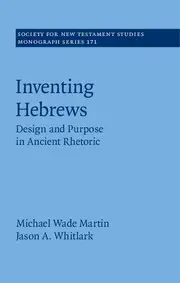

Inventing Hebrews: Design and Purpose in Ancient Rhetoric
in Society for New Testament Studies Monograph Series
Publisher
Cambridge University Press
Published
2018
ISBN-13
9781108429467
Inventing Hebrews examines a perennial topic in the study of the Letter to the Hebrews, its structure and purpose. Michael Wade Martin and Jason A. Whitlark undertake at thorough synthesis of the ancient theory of invention and arrangement, providing a new account of Hebrews' design. The key to the speech's outline, the authors argue, is in its use of 'disjointed' arrangement, a template ubiquitous in antiquity but little discussed in modern biblical studies. This method of arrangement accounts for the long-observed pattern of alternating epideictic and deliberative units in Hebrews as blocks of narratio and argumentatiorespectively. Thus the 'letter' may be seen as a conventional speech arranged according to the expectations of ancient rhetoric (exordium, narratio, argumentatio, peroratio), with epideictic comparisons of old and new covenant representatives (narratio) repeatedly enlisted in amplification of what may be viewed as the central argument of the speech (argumentatio), the recurring deliberative summons for perseverance. Resolving a long-standing conundrum, this volume offers a hermeneutical tool necessary for interpreting Hebrews, as well as countless other speeches from Greco-Roman antiquity.
- Offers one of the most thorough syntheses to date of the ancient theory of invention and arrangement
- Provides a rigorous application of that theoretical synthesis in the analysis of the unsettled questions of Hebrews' structure and purpose
- Highlights a little known (both in Biblical and Classical studies) template of arrangement that was ubiquitous in Greco-Roman rhetorical theory and practice - 'the disjointed arrangement' - and shows the template's use as a key to Hebrews' outline
- Resolves the longstanding conundrum of whether Hebrews is ultimately epideictic or deliberative in purpose, by examining the relationship of epideictic and deliberative in the theory of arrangement
- Table of Contents
- 1. Structuring Hebrews: modern approaches to an ancient text
- Part I. Laying the Foundation – Syncrisis in Hebrew:
- 2. Comparing covenants: the syncritical backbone of Hebrews
- 3. Choosing the advantageous: deliberative syncrisis and epideictic syncrisis in Hebrews
- Part II. Arranging the Speech – The Ancient Rhetorical Design of Hebrews:
- 4. Arranging an ancient speech: ancient compositional theory and a proposal for modern analysis
- 5. Proving the case: argumentatio in Hebrews
- 6. Presenting the facts relevant to the case: narratio in Hebrews
- 7. Beginning with favor: exordium in Hebrews
- 8. Ending with recapitulation and emotion: Peroratio in Hebrews
- 9. Putting it all together: the rhetorical arrangement and aim of Hebrews
- 10. Examining implications: Early Christian sermons and apostasy in Hebrews.